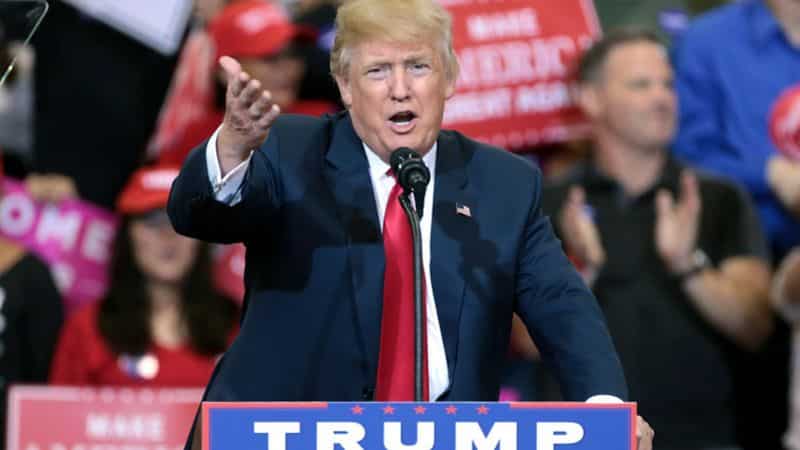Presidential hopeful Donald Trump embraces cryptocurrency donations

In a significant shift, former U.S. President and 2024 Republican nominee contender Donald Trump has announced his campaign will accept donations in the form of cryptocurrencies. This move marks a new chapter in political fundraising as the digital currency wave increasingly takes hold.
Trump’s campaign unveiled a donation page powered by Coinbase Commerce, which allows eligible contributors to make donations using various tradable cryptocurrencies, including Bitcoin (BTC), Ethereum (ETH), and Dogecoin (DOGE). The announcement comes after Senator Elizabeth Warren criticized the decentralized nature of digital currencies.
Several well-known X users have voiced their backing for the candidate embracing cryptocurrency.
Biden and Warren built an anti crypto army
Trump is building a crypto army
I’m for a pro crypto candidate as a proud crypto holder
If this makes you upset you should have worked towards educating Biden and Warren with advocacy groups and other avenues https://t.co/GE0XIIBxw0
— Wendy O (@CryptoWendyO) May 22, 2024
Trump’s crypto strategy
Trump’s decision to accept crypto donations can be seen as a direct response to Warren’s stance and an attempt to tap into the growing demographic of young voters active in the crypto space. The campaign team views this as part of their strategy to build what they refer to as a “crypto army,” strengthening its support base ahead of the November 2024 election.
The former president’s stance towards cryptocurrencies has evolved from skepticism to embracing them, signaling a potential shift in his views on digital assets and their role in the economy. This development highlights the increasing recognition of cryptocurrencies within mainstream politics and the broader financial industry.
His decision to accept crypto donations comes at a time when the cryptocurrency market is experiencing significant growth and maturation. Ethereum, Solana, Cardano, Avalanche, and other altcoins have gained popularity and are now among the cryptocurrencies accepted for his presidential campaign donations. This move could influence other political campaigns to follow suit, potentially reshaping the landscape of political fundraising in the United States.
Some prominent critics argue that digital currencies pose challenges in verifying donor authenticity due to their decentralized nature. Digital currencies operate on decentralized networks, which means transactions are recorded anonymously. This anonymity makes it difficult to confirm the true identity of donors.
At a political gathering in January 2024, Trump publicly stated that he would prevent the development of CBDCs within the United States. This stance contrasts with President Biden’s 2022 executive order intended to create regulations for digital assets.
Crypto in politics
Crypto donations in American presidential elections date back to 2015, when Sen. Rand Paul accepted Bitcoin contributions for his campaign. By adopting crypto, Trump aligns with Robert F. Kennedy Jr., another pro-crypto candidate, in the upcoming presidential race. Kennedy Jr. has also championed pro-crypto views, making cryptocurrency a significant issue in the 2024 Republican primary race.
As the United States positions itself as a leader in the crypto industry, the implications for digital currencies and blockchain technology could be profound. One area where this shift is particularly evident is political fundraising. The future of political fundraising may include more widespread adoption of cryptocurrencies.
Trump’s recent decision to accept crypto donations exemplifies this emerging trend, potentially attracting younger generations who are increasingly involved in digital currencies and thereby expanding his voter base.
However, this shift towards cryptocurrency donations in politics raises questions about transparency and accountability. Such contributions may provide anonymity, making it difficult to trace the origin of the funds, which could raise concerns about campaign finance transparency. This issue highlights the need for regulatory frameworks to adapt to the evolving landscape of digital assets.
To address these concerns, President Biden’s regulatory framework for cryptocurrencies will need to strike a delicate balance. It must foster innovation while maintaining transparency in political campaigns. The long-term impact of this approach remains to be seen. Still, it could signal a significant shift towards embracing cryptocurrencies as a legitimate currency and payment method in political contexts.
You can donate to the Trump campaign with crypto!!
Vote for the PRO crypto candidate!! pic.twitter.com/iuxfAUwE4h
— borovik (@3orovik) May 9, 2024
Accepting crypto donations could have far-reaching implications for both Trump’s campaign and the broader digital currency market.
With the United States at the forefront of cryptocurrency innovation, this development could herald a new era in political fundraising and the mainstream adoption of digital currencies as legitimate financial instruments.









